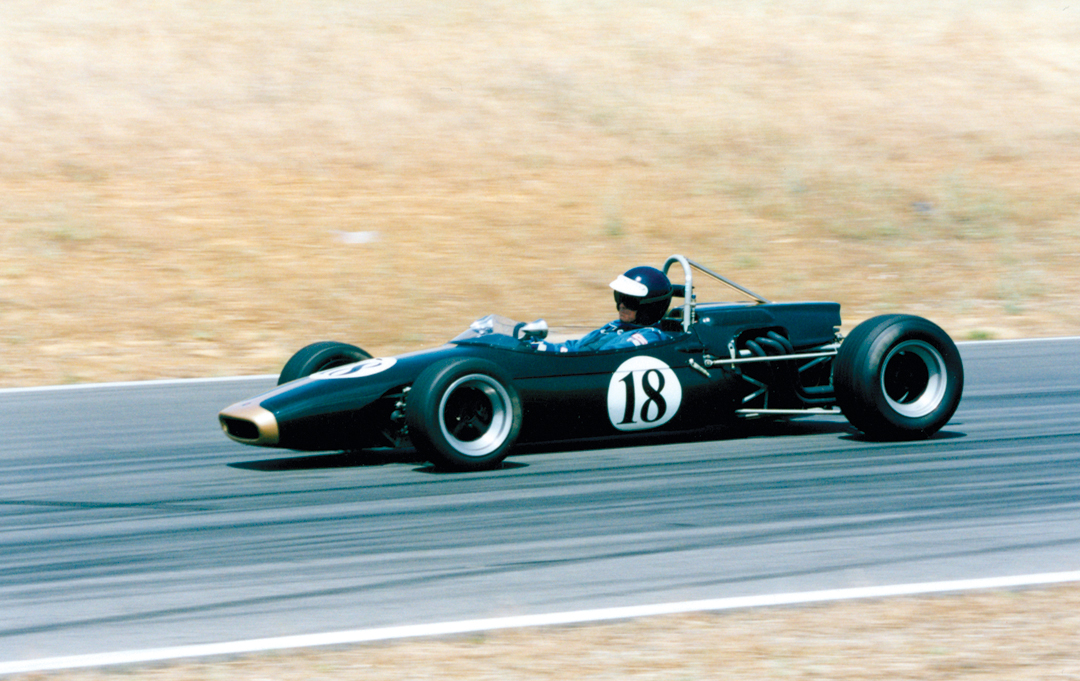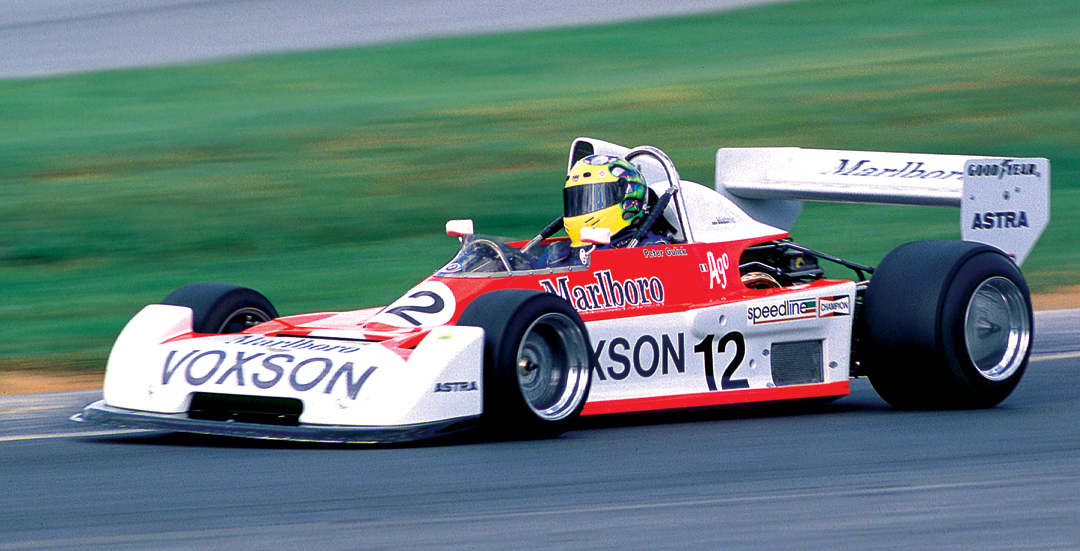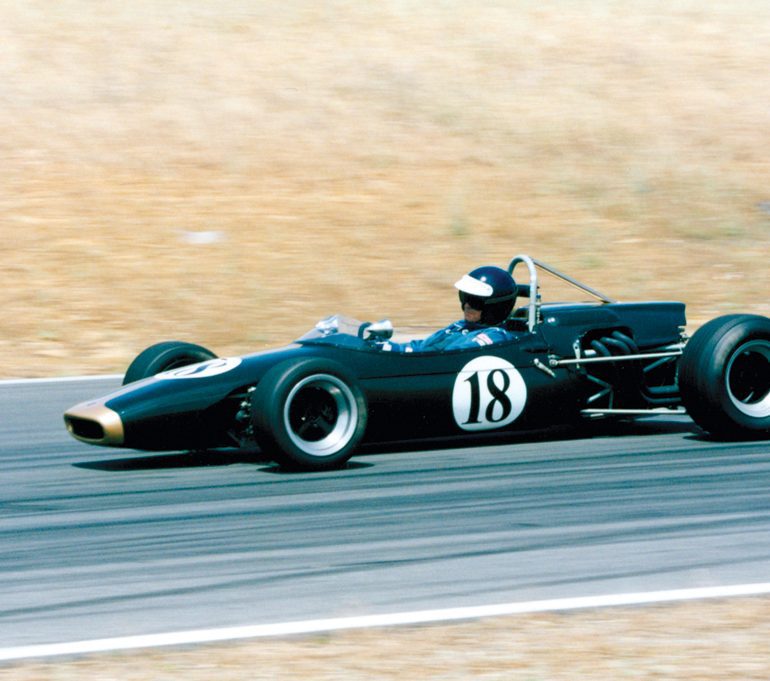From 1964-1978, a series of flat-bottomed, formula cars were manufactured to serve as a stepping stone to Formula One and the upper echelons of open-wheeled racing. In the late ’50s, F2 and F3 were consolidated into Formula Jr. However, with that category’s demise at the end of 1963, F2 was reformed utilizing highly developed 1,000-cc, fuel-injected engines until 1966. From 1967 to 1971, racecars manufactured for F2 were equipped with a more powerful gear-driven Cosworth FVA engine, while in the U.S. many of the same chassis were being outfitted with Lotus twin-cam engines for what was known as FB. By 1972, F2 graduated up to 2-liter displacement, with engines being manufactured by firms such as Cosworth, Hart and BMW. During this same period, Formula Atlantic replaced FB, both in the U.S. and overseas, with similar chassis to the F2 cars, but running the 1,600-cc Cosworth BDA or BDD engine.
Though various models were sold in both F2 and Atlantic form, the F2 cars today command a much higher value due to their more sophisticated and expensive engines. The value of these F2 variants is also bolstered by the fact that they were usually driven by some of the greatest current or up-and-coming F1 drivers of the day, names such as Jackie Stewart, Jochen Rindt, Niki Lauda, Emerson Fittipaldi and the like.
| Make | Model | Level III | Level II | Level I |
| Brabham | BT10 | $35,000 | $40,000 | $45,000 |
| BT16 | $35,000 | $40,000 | $45,000 | |
| BT18 | $40,000 | $45,000 | $55,000 | |
| BT21 | $40,000 | $50,000 | $60,000 | |
| BT23C F2 | $70,000 | $85,000 | $95,000 | |
| BT29 FB | $60,000 | $65,000 | $75,000 | |
| BT30 F2 | $80,000 | $95,000 | $105,000 | |
| BT35 FB/FA | $40,000 | $45,000 | $55,000 | |
| BT36 F2 | $80,000 | $95,000 | $105,000 | |
| BT38/BT40 F2 | $55,000 | $65,000 | $75,000 | |
| Chevron | B15B | $50,000 | $60,000 | $70,000 |
| B17B | $50,000 | $60,000 | $70,000 | |
| B18 | $45,000 | $55,000 | $65,000 | |
| B20 | $45,000 | $55,000 | $65,000 | |
| B27/B29 FA | $35,000 | $40,000 | $50,000 | |
| B34 FA | $35,000 | $40,000 | $50,000 | |
| B35 F2 | $40,000 | $55,000 | $65,000 | |
| B40 F2/B42 F2 | $50,000 | $60,000 | $70,000 | |
| Lola | T60/61/62 | $35,000 | $40,000 | $50,000 |
| T100/102 | $35,000 | $45,000 | $55,000 | |
| T360 FA | $30,000 | $35,000 | $45,000 | |
| T460 FA | $25,000 | $30,000 | $35,000 | |
| Lotus | 32 | $40,000 | $45,000 | $50,000 |
| 41B | $35,000 | $40,000 | $45,000 | |
| 48 F2 | $50,000 | $60,000 | $70,000 | |
| 59B | $40,000 | $50,000 | $60,000 | |
| 69 FB | $50,000 | $60,000 | $70,000 | |
| 69 F2 | $80,000 | $95,000 | $105,000 | |
| March | 712 F2 | $65,000 | $80,000 | $90,000 |
| 722 F2 | $50,000 | $60,000 | $70,000 | |
| 762 F2 | $55,000 | $60,000 | $70,000 | |
| 772/782 F2 | $55,000 | $65,000 | $75,000 | |
| 75B/76B | $35,000 | $40,000 | $55,000 | |
| 77B/78B | $35,000 | $40,000 | $55,000 | |
| Martini | MK19/22 F2 | $55,000 | $67,000 | $80,000 |
| McLaren | M4 FB | $45,000 | $55,000 | $65,000 |
| M4 F2 | $55,000 | $65,000 | $75,000 | |
| Merlyn | Mk7/9 | $30,000 | $35,000 | $40,000 |
| Ralt | RT1 Atlantic | $40,000 | $50,000 | $60,000 |
| Surtees | TS10 | $55,000 | $60,000 | $70,000 |
| TS15 | $45,000 | $55,000 | $65,000 |
1966 Brabham BT18 Formula 2, 3, B

For the last year of the 1,000-cc Formula 2, Ron Tauranac modified his existing BT16 design, which featured a tubular chassis and outboard suspension. While 46 BT18s were built, including Formula 3 and B specifications, only six were works Formula 2 cars. These F2 cars had slight advantages in frame design, were powered by the four-cylinder 1,000-cc Honda engine, and had a Hewland Mark VI, 5-speed gearbox. They were immensely successful, capturing the F2 title for Jack Brabham, the same year he won the F1 title in his BT19. Brabham and his teammate Denny Hulme won 12 of 15 races and were 1st and 2nd six times. Brabham is the only man to win championships, driving cars in F1 and F2, carrying his name.
1976 Chevron B34 F3, Formula Atlantic

Derek Bennett of Chevron cars was known for building well-designed, race-winning, sports racing, and single-seater racing cars. In 1976, the Formula Atlantic and Formula 3 categories were hotly contested championships. Chevron built 33 B34s for the Formula Atlantic championship. It was an aluminum monocoque design powered by a Cosworth BDA or Toyota engine mated to a Hewland gearbox. The first Atlantic win came at West Palm Beach, Florida, driven by Bobby Brown. The first Formula 3 win was at Zandvort in Holland, driven by Ricardo Patrese. Other famous drivers of B34’s included Keke Rosberg and Bobby Rahal. Today a B34 is a great car to have for the 1970s wings and slicks category.
Criteria Used For Assessing Valuations for this Guide:
- Degree of Originality
- Overall Condition, Restoration
- Technology, Design, Coachbuilder
- Production Numbers/Rarity
- Competition History
- Ownership History, Documentation
- Modern Event Eligibility
Regional Variances
The prices stated in this guide are based on U.S. values. The values of historic racing cars can vary as much as 25%-35% in other countries, depending on local market appeal, currency rates, import duties, and VAT. Most of the time, we are able to document known sales or closed escrows, as they say in real estate. When this is not possible, a logical estimate of the car’s value is given, based on its sales history and relationship to cars of its type.
The prices stated in this guide are based on U.S. values. The values of historic racing cars can vary as much as 25%-35% in other countries, depending on local market appeal, currency rates, import duties, and VAT.
LEVEL |
VALUATION CATEGORIES |
|---|---|
I |
The best combination of all criteria. |
II |
Satisfies mid-range of criteria. |
III |
In need of restoration. Meets only a few points of criteria |




